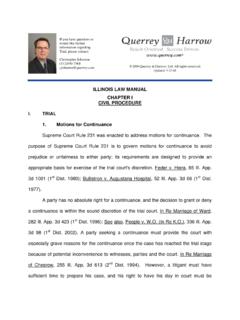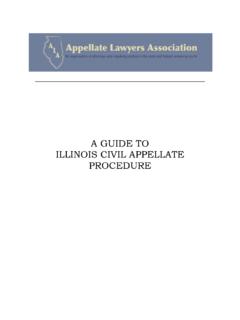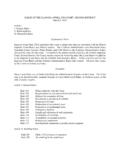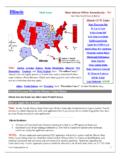Transcription of ILLINOIS LAW MANUAL CHAPTER X …
1 ILLINOIS LAW MANUAL CHAPTER X SETTLEMENTS & RELEASES B. COSTS, ATTORNEY FEES AND INTEREST 1. Costs Costs are allowances in the nature of incidental damages awarded by law to reimburse the prevailing party, to some extent, for expenses necessarily incurred in the assertion of his rights in court . Irwin v. McMillan, 322 Ill. App. 3d 861 (2nd Dist. 2001). At common law, a successful litigant was not entitled to recover from his opponent the costs and expenses of the litigation. The allowance and recovery of costs is therefore entirely dependent on statutory authorization. Vicencio v. Lincoln-Way Builders, Inc., 204 Ill. 2d 295 (2003); Village of Franklin Park v.
2 Aragon Management, Inc., 298 Ill. App. 3d 774 (1st Dist. 1998). The proper definition of costs has been left for the courts to determine. Boyle v. Manley, 263 Ill. App. 3d 200, 206 (1st Dist. 1994). Nevertheless, because statutes permitting the recovery of costs are in derogation of the common law, they must be strictly construed. Calcagno v. Personalcare Health Mgmt., Inc., 207 Ill. App. 3d 493, 502 (4th Dist. 1991). Moreover, a successful litigant is not entitled to recover the ordinary expenses of litigation. Wiegman v. Hitch-Inn Post of Libertyville, Inc., 308 Ill. App. 3d 789, 804 (2nd Dist. 1999) ( court disallowed prevailing plaintiff to recover costs associated with deposition subpoenas, medical records, court reporter, and transcription fees for discovery depositions and enlarging of photographs because no statutory authority advanced to justify such an award).
3 The following ILLINOIS statutes, among others, authorize recovery of costs: Plaintiff to recover costs. If any person sues in any court of this state in any action for damages personal to the plaintiff, and recovers in such action, then judgment shall be entered in favor of the plaintiff to recover costs against the defendant, to be taxed, and the same shall be recovered and enforced as to other judgments for the payment of money, except in the cases hereinafter provided. 735 ILCS 5/5-108. Defendant to recover costs. If any person sues in any court of this state, in any action, wherein the plaintiff may have costs and case judgment is entered in favor of the plaintiff and the action is voluntarily dismissed by the plaintiff or is dismissed for want of prosecution or judgment is entered against the plaintiff, then judgment shall be entered in favor of the defendant to recover defendant's costs against the plaintiff (except against executors or administrators prosecuting in the right of their testator or intestate)
4 , to be taxed, and the costs shall be recovered of the plaintiff, by like process as the plaintiff may have had against the defendant, in case judgment had been entered for such plaintiff. 735 ILCS 5/5-109. Judgment on motion. If in any action, judgment upon any motion directed to the complaint, answer or reply, by either party to the action, is entered against the plaintiff, the defendant shall recover costs against the plaintiff. If such judgment is entered in favor of the plaintiff, the plaintiff shall recover costs against the defendant; and the person If you have questions regarding Costs, Attorney Fees and Interest, please email One of our attorneys will contact you.
5 2012 Querrey & Harrow, Ltd. All rights reserved. - 2 - so recovering costs may collect same in the same manner as judgments for the payment of money are enforced. 735 ILCS 5/5-110. Dismissals. In all cases, where any action is voluntarily dismissed by the plaintiff or is dismissed for want of prosecution by reason that the plaintiff neglects to prosecute the same, the defendant shall recover judgment for his or her costs, to be taxed and to be collected in the same manner as judgments for the payment of money are enforced. 735 ILCS 5/5-116. Voluntary Dismissal. (a) The plaintiff may, at any time before trial or hearing begins, upon notice to each party who has appeared or each such party s attorney, and upon payment of costs, dismiss his or her action or any part thereof as to any defendant, without prejudice, by order filed in the cause.
6 (b) The court may hear and decide a motion that has been filed prior to a motion filed under subsection (a) of this section when that prior filed motion, if favorably ruled on by the court , could result in a final disposition of the cause. (c) After trial or hearing begins, the plaintiff may dismiss, only upon terms fixed by the court (1) upon filing a stipulation to that effect signed by the defendant, or (2) on motion specifying the ground for dismissal, which shall be supported by affidavit or other proof. (d) A dismissal under subsection (a) of this section does not dismiss a pending counterclaim or third party complaint. (e) Counterclaimants and third-party plaintiffs may dismiss upon the same terms and conditions as plaintiffs.
7 735 ILCS 5/2-1009. Following instructions to construe costs statutes narrowly, trial courts have traditionally been reluctant to award much in the way of costs to a prevailing litigant. Historically, all that was recoverable to a prevailing plaintiff was his filing fees, appearance and jury demand fees, and trial subpoena costs. Household Int l v. Liberty Mutual, 195 Ill. 2d 578 (2001). As far back as 1982, the ILLINOIS Supreme court determined that only those costs associated with depositions necessarily used at trial could be awarded to a prevailing party. Galowich v. Beech Aircraft Corp., 92 Ill. 2d 157, 166 (1982). The appellate court in Boyle defined necessarily used at trial as when a witness dies or disappears prior to trial.
8 Boyle, 263 Ill. App. 3d at 206. Thus, depositions used for impeachment or to refresh a recollection are not necessarily used at trial and should not be awarded as costs to a prevailing party at trial. In 1999, the Fifth District appellate court , in Perkins v. Harris, 308 Ill. App. 3d 1076 (5th Dist. 1999), awarded to a prevailing plaintiff the costs associated with the videotaped evidence deposition of a treating physician including the practitioner s professional fee for testifying, and the costs of recording, transcribing and editing the videotaped testimony. The basis for the award was the trial court s finding that the physician was unable to appear in person at trial due to his demanding surgery schedule.
9 Id. at 1080. Thus, the Perkins court determined that the evidence deposition was necessarily used at trial. Id. Thereafter, trial courts in northern ILLINOIS routinely awarded costs to prevailing plaintiffs associated with physicians and chiropractors professional fees and evidence deposition transcript fees. Some trial courts also awarded to prevailing plaintiffs the costs associated with a medical care provider s live appearance at trial. - 3 - In June 2001, however, the Second District appellate court , in Irwin v. McMillan, 322 Ill. App. 3d 861 (2nd Dist. 2001), criticized the Perkins decision and its unjustified extension of costs to a prevailing litigant.
10 The court in Irwin ruled that a medical care provider s evidence deposition was not necessarily used at trial just because the provider s busy schedule prevented him from appearing in person at trial. Id. at 866. In other words, an evidence deposition under such circumstances was not indispensable to the trial, such as when a witness dies or disappears prior to trial. Id. As such, the prevailing plaintiff was not entitled to recover the costs associated with the taking of the evidence deposition. Id. at 867. The court in Irwin also determined that there was no statutory justification for a trial court s award of costs associated with a medical care provider s live appearance at trial.











